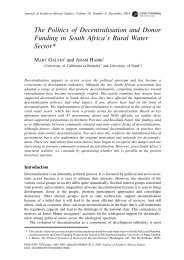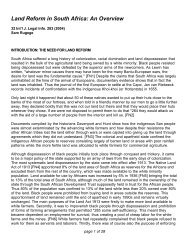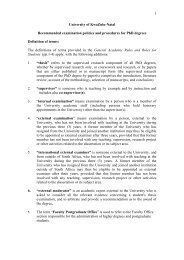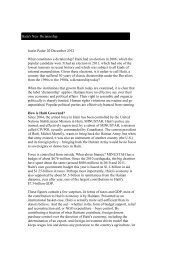Bell, Trevor : Unemployment in South Africa
Bell, Trevor : Unemployment in South Africa
Bell, Trevor : Unemployment in South Africa
Create successful ePaper yourself
Turn your PDF publications into a flip-book with our unique Google optimized e-Paper software.
to call for qualification. Let us say that an economy is subject to<br />
a s<strong>in</strong>gle exogenous shock, <strong>in</strong> the form of higher energy prices or a<br />
sudden burst of <strong>in</strong>tensified competition from foreign producers of<br />
mhnufactured goods and that this necessitates substantial structural<br />
change. The adjustment to such a s<strong>in</strong>gle external shock might be<br />
exceed<strong>in</strong>gly protracted.<br />
It may for <strong>in</strong>stance, ;quire substantial retra<strong>in</strong><strong>in</strong>g of the labour<br />
force; a reallocation of labour among different skill levele (both<br />
upwards and - <strong>in</strong> the case of workers too old or otherwise unfit to be<br />
retra<strong>in</strong>ed for other skilled jobs - downwards) and among different<br />
sectors and regions;<br />
a reallocation of <strong>in</strong>vestment resources away<br />
from <strong>in</strong>dustries mak<strong>in</strong>g <strong>in</strong>tensive use of energy and twards energy<br />
produc<strong>in</strong>g sectors, and a general alteration of the structure of the<br />
stock of productive capital.<br />
Also for various good reasons (not<br />
simply because of government <strong>in</strong>tervention or the unreasonable<br />
stubborness of workers) relative and absolute levels of real wages<br />
may be <strong>in</strong>flexible1 ) .<br />
Furthermore, it should be noted that <strong>in</strong> the middle of a period of<br />
prolonged stagnation <strong>in</strong> the world economy even thoroughgo<strong>in</strong>g<br />
competition domestically <strong>in</strong> a particular national economy will not<br />
necessarily ensure movement towards full employment. For contrary to<br />
widespread op<strong>in</strong>ion, the price and wage elasticities of demand for<br />
goods and labour respectively may be very low even <strong>in</strong> the case of a<br />
small, open economy, <strong>in</strong> certa<strong>in</strong> world economic conditions. Sometimes<br />
1) For <strong>in</strong>stance it may be necessary for some skilled workers thrown out<br />
of their jobs to offer themselves at substantially reduced rates of<br />
pay <strong>in</strong> the unskilled labour market <strong>in</strong> order for markets to "clear":<br />
they may not readily do this and, perhaps rightly. society may not<br />
expect them to do so. Also the elasticity of the demand for labour<br />
may be so lar, tak<strong>in</strong>g <strong>in</strong>to account the adverse effect of general wage<br />
cuts on the demand for goods and services, that the new equilibrium<br />
wage levels may require a decrease <strong>in</strong> the real wage bill accru<strong>in</strong>g to<br />
workers as a whole. In these circumstances they may be expected to<br />
resist wage reductions determ<strong>in</strong>edly (See Solow (1980) on this and<br />
other issues pert<strong>in</strong>ent to our discussion).

















